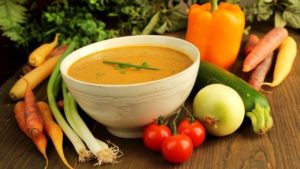Warm and well, inside and out

Keep well and warm this winter with natural health tips from Naturopath, Sonya Byron.
With the snow earlier this month a beautiful reminder that winter has really arrived in the mountains, perhaps you’ve been thinking of optimising your health and wellness this season.
There are many natural ways to support the health and function of your immune system and to better resist any colds, flus or other infections you may come into contact with. Shared below are a few of my favourite immune supportive tips and tricks, many of these are simple, easily accessible, and inexpensive too.
Healthy dietary and lifestyle habits are the foundation of good immune and general health. All the herbal and nutritional remedies in the world won’t really help us if we’re chronically stressed, sleep deprived, sedentary, and poorly nourished!
To optimise your immune health this season:
- Eat a healthy, whole foods diet, emphasising fresh, organic fruits and vegetables, quality proteins, including plenty of plant-based proteins, and pre and probiotic foods. Probiotic foods, such as kefir, sauerkraut and kimchi, introduce beneficial bacteria into the gut, and prebiotic foods, such as onion, garlic and leeks, provide fuel for these beneficial bacteria. These foods therefore support the health and function of the digestive system, important for winter wellness as increasing research evidence indicates that digestive and immune health are closely related.
- Ensure that you are getting adequate sleep each night. Individual requirements vary, but the majority of sleep researchers agree that most people require 7-9 hours sound sleep per night to feel their best and to function well during the day. It’s estimated that even one night of interrupted sleep can cause a 70% reduction in the activity of certain immune cells within the body.
- Move your body for a minimum of 30 minutes daily! It’s ideal if at least some of your exercise is outside in the fresh air and sunshine, as adequate vitamin D stores are required for optimum immune health. Exercise is also important for our mental health and wellbeing, which influences our immune health and function (see stress, below).
- Address your stress. Uncontrolled stress affects every system in the body, and takes a particular toll on the immune system. Stress management techniques such as mindfulness meditation, Yoga or journaling may be helpful, and during this lockdown, it’s important to reach out for social support too. Be sure to connect with family members or friends daily, go for a walk together if they live locally, or connect either online or by phone (a shared cup of tea over a Zoom call can be a fun way to catch up).
- Wash your hands regularly! This is especially important if you are coming into contact with the general public, or travelling by public transport. Good, old-fashioned soap and warm water is all that’s required, there is no evidence that anti-bacterial soaps and sanitisers are any more effective at removing pathogens than ordinary soap and water, and some evidence that these may contribute to the growing problem of microbial resistance.

Having taken care of the basics, our herbal and whole food friends and allies can provide us with additional immune support if desired. A few of my favourite natural supports for winter wellness include:
Echinacea
Traditionally used in Native American healing traditions for infection, tooth ache and snake bite, echinacea is a renowned immune enhancing and anti-inflammatory herb, widely prescribed today for respiratory infection. Studies suggest that echinacea can reduce the duration of the common cold and flu.
Elder
Both the flowers and berries have traditionally been used to support immune health and function. The delicious berries are a source of natural antioxidants including vitamin C, which is vital to the immune system’s ability to respond to external pathogens, and they also have potent anti-viral properties.
Garlic
Garlic has powerful, anti-microbial properties, and was even used by the Russian Red Army to treat infection during World War 2 (hence its nickname, Russian penicillin).
Ginger
A wonderfully warming circulatory stimulant, ginger also has anti-inflammatory and anti-bacterial properties and supports healthy digestive function.
Lemons
Lemons are rich in natural vitamin C and bioflavonoids, and have traditionally been used in Eastern and Western healing traditions as a digestive aid (warm lemon water on rising, anyone?) and as an immune system tonic.
Honey
Raw honey has a long history of use as a sweet and soothing remedy for dry and irritated coughs and sore throats.
Thyme
Thyme contains thymol, which has strong anti-microbial properties, and is also an antioxidant and expectorant herb (it increases the expulsion of excess mucous from the lungs). Thyme can therefore offer symptom relief for congested colds and coughs.
Medicinal mushrooms
There are now hundreds of species of fungi, such as shiitake and reishi, which have been proven to have anti-microbial and anti-inflammatory properties. Studies have also shown that the B-glucans in medicinal mushrooms can increase the activity of various immune cells.
The above herbs, spices and foods can be purchased in capsule/tablet form, but they’re often quite expensive and excessively packaged in plastic. Why not buy them in bulk at the Co-op
instead and incorporate them into your existing diet and lifestyle to support your winter wellbeing?
For example, you could sip on echinacea, elder flower and thyme tea, add garlic, ginger and medicinal mushrooms to your cooking, make an old-fashioned hot honey, lemon and ginger if
you’re ill, or if you’d like to make something a little more potent to support you during a cold, flu or other infection, here’s a recipe for elderberry syrup below. This is an excellent home remedy for viral respiratory infections, well loved by adults and kids (age 2 and over) alike:
Elderberry syrup
Ingredients:
100g dried elderberries
3 cups water
25g sliced ginger
1 tsp cinnamon
2 tsp fennel seeds
1 cup (approx) raw honey
1 lemon (juice)
Method:
– Add elderberries, water, ginger, cinnamon and fennel to a saucepan and simmer for 30 minutes. Crush the berries during the simmering process.
– Remove from the heat, strain and measure the liquid.
– Add twice as much honey as liquid to the strained liquid.
– Return to the saucepan, and simmer gently to dissolve the honey and until the syrup begins to thicken.
– Add fresh lemon juice, decant, and refrigerate to store (use within a few months).
Take one tbs per day as a winter tonic, or one tbs three times daily to support your recovery from winter lurgies.
Sonya Byron is a Naturopath in clinical practice at Lower Mountains Health & Healing in Blaxland. A former organic vegetable farmer, she’s passionate about empowering people to care for their own health (and save money, time and the planet in the process) by learning how to grow and preserve their own food, and how to make their own simple herbal and nutritional remedies for common health complaints. For further information, visit Sonya Byron Plant Medicine
Living with the Seasons – Tips for Winter
by Sallyanne Pisk
From an Eastern medicine perspective, winter is an important season for rest, reflection and introspection. To aide this process we are encouraged to nourish ourselves with warm drinks and meals. And eating well supports our immunity too!
Three of my top tips for winter are:
#1 Use slow cooking methods
Soups, casseroles, curries and baked vegetables are ideal for winter nourishment. Slow cooking increases the warmth of the food and aids the release of nutrients. Your day might start with warm oat or mixed grain porridge and then you might have a vegetable lasagne for lunch and dal curry for dinner. Please visit the eatingforyou.com.au website for recipes.

#2 Add warm spices
Warming spices include: Anise seeds, black peppercorn, cardamom, cinnamon, cloves, fennel seeds, fenugreek, garlic, ginger mustard seeds, nutmeg and turmeric. These spices are all available for purchase from the co-op! Many of the recipes on the Eating for You website contain these warming and nourishing spices.
#3 Warm drinks
Some of my favourites are:
Fresh lemon, ginger, honey with warm water.
A sprig of thyme in warm water is not only tasty, it is great to ward off and sooth sore throats.
Lemongrass and ginger.
Chai spice on its own or with rooibos or green or black tea. You might also like to add honey and milk of your choice.
If you would like more tips for eating and living mindfully with the seasons, then I encourage you to take a look at the Eating for You book in the Big Little Shop. The book is ideal if you want to get off the emotional eating and dieting roller coasters for good, and create a way of eating that is personalised to you and lasts. The book comes with a free downloadable workbook/ journal.
Sallyanne Pisk is an Accredited Practising Dietitian and Mindfulness Practitioner, and is one of the Co-op’s Wellness Wednesday Practitioners. For more information visit eatingforyou.com.au
(The information in this article is for educational purposes only and is not intended as a substitute for health care advice. Please consult your friendly local naturopath, herbalist or other health care practitioner for personalised advice, particularly if you have a diagnosed medical condition or take pharmaceutical medications).


